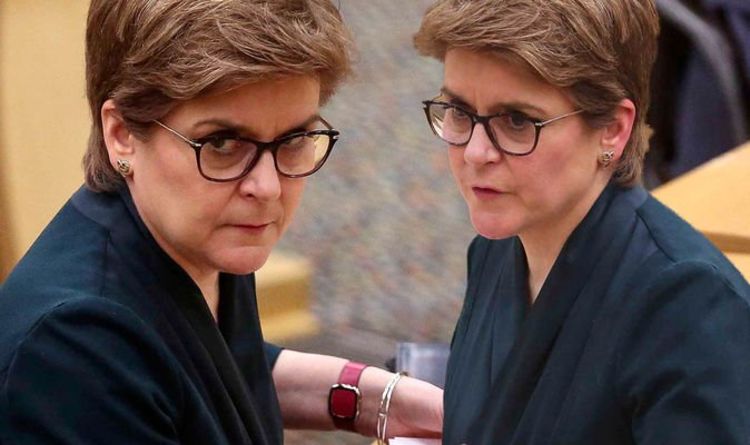Nicola Sturgeon announces the lifting of Omicron restrictions
We use your sign-up to provide content in ways you’ve consented to and to improve our understanding of you. This may include adverts from us and 3rd parties based on our understanding. You can unsubscribe at any time. More info
In an interview with editor and author Sam Baker for the Shift, a podcast that explores the challenges in life for women over the age of 40, Sturgeon, 51, spoke plainly about the menopause and how she feels “conscious” to use her platform and profile to talk about it. However, due to the “personal nature” of the subject, discussions do not come without the First Minister feeling “far out of [her] comfort zone”. Despite her reservations, the Scottish politician revealed some insight into her own experiences with “the change”.
During the podcast, Sturgeon said: “We talk about the menopause much more, and I’m very conscious of being a woman with a profile and a platform, a fair degree of influence, so I feel a responsibility – given that I’m at that age – to talk about it myself.
“And yet even talking about it like this, I am so far out of my comfort zone, in terms of the intensely personal nature of it.
“That tells me no matter how far we’ve come in this discussion, we still have a long way to go that somebody like me still feels kind of uncomfortable with it.”
Referring to herself specifically, Sturgeon continued to say that she was “still in the foothills” of menopause, elaborating to say: “It’s definitely kind of there about.”

Sturgeon went on to explain that she has already had a conversation about taking hormone replacement therapy (HRT) with her doctor, highlighting the generational horror stories that she grew up with, questioning how many women in the past had to suffer in silence due to a lack of understanding.
“Even though there is more information available than there has ever been before, there’s still a massive amount of guesswork about it. We’re still all feeling our way through it,” she added.
The NHS explains that the menopause is when a woman stops having periods and is no longer able to get pregnant naturally. This natural part of ageing usually occurs between the ages of 45 and 55 as a woman’s oestrogen levels decline.
However, the health website explains that around one in 100 women experience menopause before they turn 40 years of age. This is known as premature menopause.
All women experience menopause symptoms differently. Some will react quite severely whilst others may not have that big of an impact.
The most common symptoms of menopause incude:
- Hot flushes
- Night sweats
- Vaginal dryness and discomfort during sex
- Difficulty sleeping
- Low mood or anxiety
- Reduced sex drive (libido)
- Problems with memory and concentration.
Confessing that she has started to feel “hotter” overnight, Sturgeon was asked how she might deal with a hot flush if one struck at work.
In response the First Minister said: “I would like to think I would be open about it. If you look around the world, there’s not been that many women leaders … I guess Angela Merkel must have gone through when she was in office, Hillary Clinton … so if you’ve got that platform, then I would like to think I would use that positively, but I’m also a human being.”

Although stressing that she has not yet experienced these symptoms to a great extent, she elaborated to say that she struggles to sleep at night and “all that sport of thing”.
Sturgeon added that these symptoms of menopause are not just affecting her, but her husband Peter Murrell: “So I’ve got windows open in the depth of winter, my poor husband is shivering,” she explained.
“I’ve thought to myself: what if that happens when I’m on my feet in parliament in the middle of First Minister’s questions? What would I do? That could happen any time. I’m not sure I will know the answer to that question until it happens.”
She added: “Maybe male opposition leaders should be thinking about what I will do, as well.”

In order to tackle symptoms that may be disrupting your everyday life, GPs typically offer various treatments and suggest lifestyle changes. The most common being HRT.
HRT helps to relieve most of the common menopausal symptoms including hot flushes and night sweats. It can also help prevent weakening of the bones (osteoporosis), which is more common after the menopause.
There are several different types of HRT available in the UK, with most women taking a combination of the hormones oestrogen and progestogen, although it is possible to take oestrogen on its own. This can be taken as tablets, skin patches, gels, vaginal creams or rings.
If you’re unable to take HRT or decide not to, you may want to consider alternative ways of controlling your menopausal symptoms. These include:
- Lifestyle measures – exercising regularly, eating a healthy diet, cutting down on coffee, alcohol and spicy foods, and stopping smoking
- Tibolone – a medicine that’s similar to combined HRT (oestrogen and progestogen), but may not be as effective and is only suitable for women who had their last period more than one year ago
- Antidepressants – some antidepressants can help with hot flushes and night sweats, although they can also cause unpleasant side effects such as agitation and dizziness
- Clonidine – a non-hormonal medicine that may help reduce hot flushes and night sweats in some women, although any benefits are likely to be small.
Source: Read Full Article
